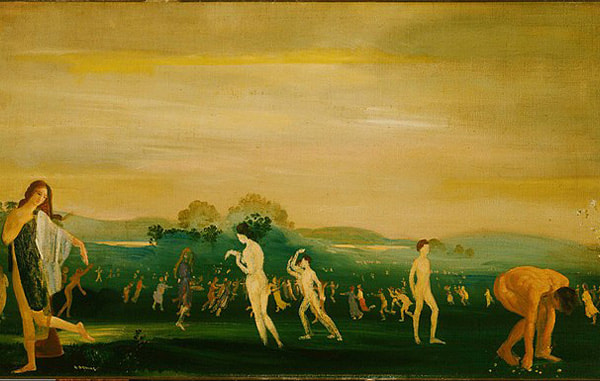In ancient Rome, the lands of the blessed dead were known as Elysium, or the Elysian Fields. They were a part of the underworld set aside for the virtuous, the heroic, and the just. Those who valiantly died a hero’s death in battle were thought to be destined for Elysium. It was a paradisal realm which Homer described in The Odyssey, writing, “The immortals will send you to the Elysian plain at the ends of the earth, where fair-haired Rhada-manthys is. There, life is supremely easy for men. No snow is there, nor ever heavy winter storm, nor rain, and Ocean is ever sending gusts of the clear-blowing west wind to bring coolness to men.”
As the source of the quote implies, the concept of the Elysian Fields comes to us—as to the Romans—by way of ancient Greece. The idea is one of the ancient iterations of a belief in the afterlife from which later cultures, including our own, derive an idea of heaven. The word “heaven” comes from the Germanic/Old English root heofon, meaning the “abode of God or the gods,” which implies the realm of the skies. The word “heaven” has taken on a distinctly Judeo-Christian association. In biblical texts where we find the Latin coeli, meaning “sky,” most often translated as “heaven.” We find also in the Hebrew Book of Genesis (6:4) beings called the nephilim, from the semitic root nefel, meaning “to fall.” These are beings who, according to Judaic scriptural texts both canonical and apocryphal, “descended” or “fell” to earth from the “heavens” or skies.
Subscribe to the New PRS Journal to read on...
As the source of the quote implies, the concept of the Elysian Fields comes to us—as to the Romans—by way of ancient Greece. The idea is one of the ancient iterations of a belief in the afterlife from which later cultures, including our own, derive an idea of heaven. The word “heaven” comes from the Germanic/Old English root heofon, meaning the “abode of God or the gods,” which implies the realm of the skies. The word “heaven” has taken on a distinctly Judeo-Christian association. In biblical texts where we find the Latin coeli, meaning “sky,” most often translated as “heaven.” We find also in the Hebrew Book of Genesis (6:4) beings called the nephilim, from the semitic root nefel, meaning “to fall.” These are beings who, according to Judaic scriptural texts both canonical and apocryphal, “descended” or “fell” to earth from the “heavens” or skies.
Subscribe to the New PRS Journal to read on...
Nothing comes from nothing. Manly Hall’s vision for the All-Seeing Eye was entirely supported by contributions from its readers who paid for their subscription with gifts made according to their means. Manly Hall wrote,
“This magazine is published and distributed privately to those who make possible with their financial support its publication. The magazine cannot be bought and has no fixed value. Like all of the ancient teachings which it seeks to promulgate, it has no comparative value, but the students must support it for its own intrinsic merit.”



